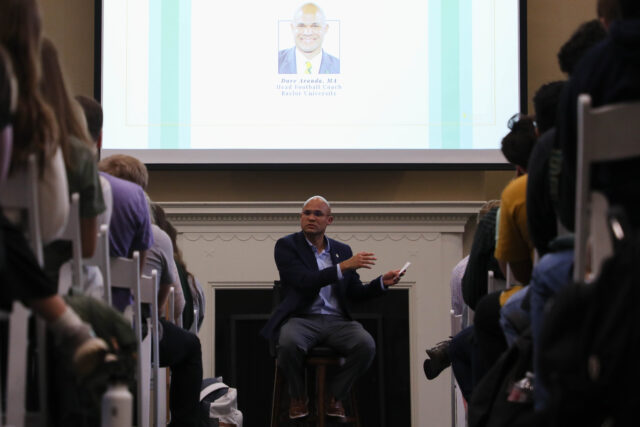By Shelby Peck | Staff Writer
Dave Aranda, football head coach, addressed a room full of honors students on faithful leadership Thursday night as an installment of the Honors Residential College Formation Series. He discussed his emphasis on the person over the player and his journey to Baylor.
The Formation Series offers students the opportunity to listen to various speakers share what it means to be a “whole person, in heart, soul, mind and strength — the fundamental commitment of our community.”
Three discussions are held per semester, and while the presentations are open to anyone, honors students are able to write a reflection afterward for honors credit.
Aranda focused on the two worlds which contribute to the development of a person — the world as it is and the world as it should be. He said that while football often focuses on the world as it should be, it is in the world as it is that one’s true strength of character is revealed.
“As a coach, you’re going to get talked about living in the world as it should be,” Aranda said. “But, you’re going to be judged in the world as it is … in whatever profession you go, you’re going to get some of that. You have to live in both worlds.”
Aranda’s presentation “Person>Player!” was held in the Alexander Reading Room in Alexander Residence Hall. He focused on development as a person over a player through authentically being oneself and loving others well. With references to “Coco” and “Creed III,” he captivated the attention of those in attendance.
Bentonville, Ark., junior Lydia Pehlman lives in the HRC and said Aranda’s lecture was interesting, as she learned more about his management style.
“[Aranda’s] very wise. I actually learned about him in my management class and how his management style for the football team was just unique,” Pehlman said. “It really created a culture that was built on success, teamwork and humility rather than just being a football team that was purely focused on winning.”
She said attending the Formation Series lectures has helped her grow as a faithful leader by exposing her to new aspects of leadership.
“A lot of people have come who are strong leaders in the area they present on. I’m really honored to have been able to learn from them,” Pehlman said.
Monument, Colo., sophomore Joshua Stein said Aranda’s presentation taught him about personal growth and what it means to go through failure and still succeed.
“I didn’t know a lot really about [Aranda] or about football before coming to Baylor, but it definitely changed how I see how Baylor approaches who they hire — for all their positions,” Stein said. “Being good at football was not the only reason he was hired.”
Much of Aranda’s development as a person over a player came throughout his transition from Louisiana State University to Baylor in 2020. He said after the confetti fell in the stadium when he won the NCAA Championship as the defensive coordinator for LSU, he was left with questions about his purpose.
“The culture there, there was such … use of fear, like we had to achieve or else. Just to be acknowledged, you had to achieve really high,” Aranda said. “After a while, all of that becomes exhausting.”
He said the exhaustion and brutality of college football contributed to his transition to Baylor. Rather than beginning with power, Aranda said he wanted to begin with love and build a bridge eventually leading to power and success.
“If you start the bridge with power, I don’t think you’ll ever make it to love,” Aranda said. “If you can already have it the way you want now with the use of force, why would you try to even make it over here?”
He said his development, as well as that which he tries to instill in his players, undergoes four stages: unconscious and conscious incompetence, conscious and unconscious competence.
Like the uncertainty Aranda felt when he first became head coach at Baylor, looking to other head coaches for guidance and even certain ways of speaking, the new football players feel similarly. They transition from ignorance to certainty and humble confidence through the support needed to succeed both as people and as players.
“What has gotten you to this level where you are right now is what you’ve done before. If you want a big change in your life, you’re going to have to make some big changes,” Aranda said. “Person over player is about helping guide people through that.”



